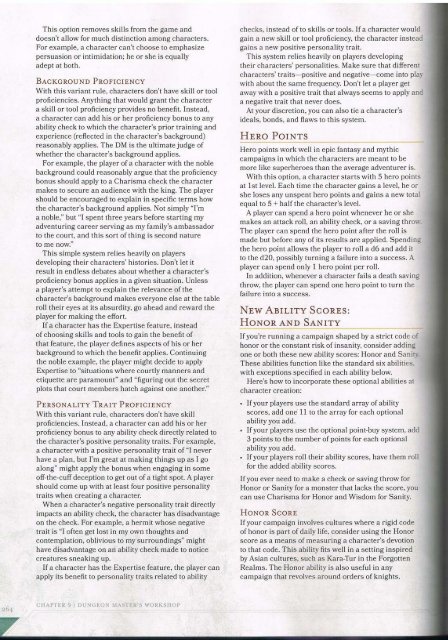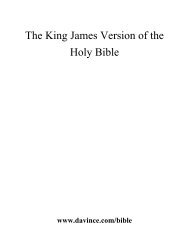Dungeon Master's Guide
Create successful ePaper yourself
Turn your PDF publications into a flip-book with our unique Google optimized e-Paper software.
This option removes skills from the game and<br />
doesn't allow for much distinction among characters.<br />
For example, a character can't choose to emphasize<br />
persuasion or intimidation; he or she is equally<br />
adept at both.<br />
BACKGROUND PROFICIENCY<br />
With this variant rule, characters don't have skill or tool<br />
proficiencies. Anything that would grant the character<br />
a skill or tool proficiency provides no benefit. Instead,<br />
a character can add his or her proficiency bonus to any<br />
ability check to which the character's prior training and<br />
experience (reflected in the character's background)<br />
reasonably applies. The DM is the ultimate judge of<br />
whether the character's background applies.<br />
For example, the player of a character with the noble<br />
background could reasonably argue that the proficiency<br />
bonus should apply to a Charisma check the character<br />
makes to secure an audience with the king. The player<br />
should be encouraged to explain in specific terms how<br />
the character's background applies. Not simply "I'm<br />
a noble," but "I spent three years before starting my<br />
adventuring career serving as my family's ambassador<br />
to the court, and this sort of thing is second nature<br />
to me now."<br />
This simple system relies heavily on players<br />
developing their characters' histories. Don't let it<br />
result in endless debates about whether a character's<br />
proficiency bonus applies in a given situation. Unless<br />
a player's attempt to explain the relevance of the<br />
character's background makes everyone else at the table<br />
roll their eyes at its absurdity, go ahead and reward the<br />
player for making the effort.<br />
If a character has the Expertise feature, instead<br />
of choosing skills and tools to gain the benefit of<br />
that feature, the player defines aspects of his or her<br />
background to which the benefit applies. Continuing<br />
the noble example, the player might decide to apply<br />
Expertise to "situations where courtly manners and<br />
etiquette are paramount" and "figuring out the secret<br />
plots that court members hatch against one another."<br />
PERSONALITY TRAIT PROFICIENCY<br />
With this variant rule, characters don't have skill<br />
proficiencies. Instead, a character can add his or her<br />
proficiency bonus to any ability check directly related to<br />
the character's positive personality traits. For example,<br />
a character with a positive personality trait of "I never<br />
have a plan, but I'm great at making things up as I go<br />
along" might apply the bonus when engaging in some<br />
off-the-cuff deception to get out of a tight spot. A player<br />
should come up with at least four positive personalit)l<br />
traits when creating a character.<br />
When a character's negative personality trait directly<br />
impacts an ability check, the character has disadvantage<br />
on the check. For example, a hermit whose negative<br />
trait is "I often get lost in my own thoughts and<br />
contemplation, oblivious to my surroundings" might<br />
have disadvantage on an ability check made to notice<br />
creatures sneaking up.<br />
If a character has the Expertise feature, the player can<br />
apply its benefit to personality traits related to ability<br />
checks, instead of to skills or tools. If a character would<br />
gain a new skill or tool proficiency, the character instead<br />
gains a new positive personality trait.<br />
This system relies heavily on players developing<br />
their characters' personalities. Make sure that different<br />
characters' traits- positive and negative- come into play<br />
with about the same frequency. Don't let a player get<br />
away with a positive trait that always seems to apply and<br />
a negative trait that never does.<br />
At your discretion, you can also tie a character's<br />
ideals, bonds, and flaws to this system.<br />
HERO POINTS<br />
Hero points work well in epic fantasy and mythic<br />
campaigns in which the characters are meant to be<br />
more like superheroes than the average adventurer is.<br />
With this option, a character starts with 5 hero point<br />
at 1st level. Each time the character gains a level, he or<br />
she loses any unspent hero points and gains a new total<br />
equal to 5 + half the character's level.<br />
A player can spend a hero point whenever he or she<br />
makes an attack roll, an ability check, or a saving throw<br />
The player can spend the hero point after the roll is<br />
made but before any of its results are applied. Spend in_<br />
the hero point allows the player to roll a d6 and add it<br />
to the d20, possibly turning a failure into a success. A<br />
player can spend only 1 hero point per roll.<br />
In addition, whenever a character fails a death saving<br />
throw, the player can spend one hero point to turn the<br />
failure into a success.<br />
NEW ABILITY SCORES:<br />
HONOR AND SANITY<br />
If you're running a campaign shaped by a strict code of<br />
honor or the constant risk of insanity, consider adding<br />
one or both these new ability scores: Honor and S ani _<br />
These abilities function like the standard six abilities.<br />
with exceptions specified in each ability below.<br />
Here's how to incorporate these optional abilities at<br />
character creation:<br />
If your players use the standard array of ability<br />
scores, add one 11 to the array for each optional<br />
ability you add.<br />
If your players use the optional point-buy system, add<br />
3 points to the number of points for each optional<br />
ability you add.<br />
If your players roll their ability scores, have them roll<br />
for the added ability scores.<br />
If you ever need to make a check or saving throw for<br />
Honor or Sanity for a monster that lacks the score, you<br />
can use Charisma for Honor and Wisdom for Sanity.<br />
HoNOR ScoRE<br />
If your campaign involves cultures where a rigid code<br />
of honor is part of daily life, consider using the Honor<br />
score as a means of measuring a character's devotion<br />
to that code. This ability fits well in a setting inspired<br />
by Asian cultures, such as Kara-Tur in the Forgotten<br />
Realms. The Honor ability is also useful in any<br />
campaign that revolves around orders of knights.<br />
CHAPTER 9 I DUNGEON MASTER'S WORKSHOP




